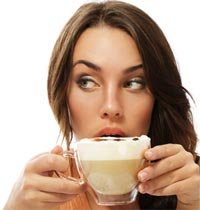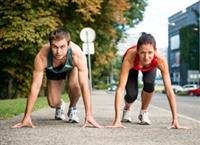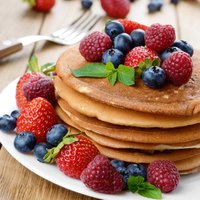Caffeine Before Running a Marathon
Caffeine has been found to increase athletic endurance in numerous scientific studies. For runners, caffeine can be h

elpful in reducing the effects of fatigue. In the marathon, that means faster speed and greater ability to stay running. However, caffeine is not without side effects, which is some cases, may affect performance negatively.
Caffeine is a natural pesticide. Yes, that's right, a pesticide! It is used by plants to ward off feeding by insects. However, in humans, it's a stimulant to the central nervous system. We get caffeine from a variety of sources, but primarily from coffee beans and the leaves of the tea plant (Camellia sinensis). Common means of ingesting caffeine include: coffee, black and green tea, soda pop, energy drinks, and chocolate.
Caffeine has been found to slow the use of muscle glycogen. Glycogen is the carbohydrate utilized by the body for energy. The specific mechanism for the reduced muscle glycogen use is unclear, but it may be through promoting fat stores for energy use.
Optimal Caffeine Intake
The optimal intake for caffeine before a big race depends upon two factors: your tolerance and your size. If you're a regular caffeine user, more caffeine will be required to get the same boost as someone who uses it infrequently. Your weight matters too, use this formula to determine your optimal caffeine intake range:
(Your weight in pounds) times (1.5) = low range of consumption (in mg)
(Your weigth in pounds) times (3.0) = high range of consumption (in mg)
So, if you weigh 150 lbs, your range will be 225 mg - 450 mg. Here is a list of body weights and optimal caffeine ranges:
- 100 lbs = 150 - 300 mg
- 120 lbs = 180 - 360 mg
- 140 lbs = 210 - 420 mg
- 160 lbs = 240 - 480 mg
- 180 lbs = 270 - 540 mg
- 200 lbs = 300 - 600 mg
- 220 lbs = 330 - 660 mg
You'll want to ingest this caffeine about 1 hour before you race. You should aim for the low end of the range if you're an infrequent caffeine or low-dose consumer (1 cup of coffee per day). The higher range would apply to a more consistent caffeine user (3 cups or more of coffee per day). The higher parts of the ranges do require a fairly large dose of caffeine, if you plan on consuming at that level, you should practice before race day (and get doctor approval if you have any impacting health conditions!).
Caffeine in moderate amounts has NOT been found to be dehydrating. Laboratory tests have uncovered no difference in urine outpout in athletes drinking as much as 5 cups of coffee, as compared to 5 cups of water.
Caffeine Sources
Use the following list for how much caffeine is in various sources:
- Coffee (8 oz) - 130 mg avg, (100-200 mg range)
- Espresso (1 oz) - 40 mg avg (30-90 mg range)
- Coca-Cola (12 oz) - 34 mg
- Moutanin Dew (12 oz) - 55 mg
- Red Bull (8.3 oz) - 80 mg
- Black Tea (8 oz) - 50 mg (40-120 mg range)
- Green Tea (8 oz) - 25 mg (20-60 mg range)
- Hershey's Dark Chocolate Bar (1.45 oz) - 33 mg
- Hershey's Milk Chocolate Bar (1.55 oz) - 9 mg
- Standard Caffeinated Energy Gels (1-1.5 oz) 20-25 mg
- GU Roctane Energy Gels (1.1 oz) 35 mg
- GU Chomps Peach Tea (8.5 oz) 80 mg
- Clif Shot Turbo Gels (1.2 oz) 100 mg
Caffeine Products for Runners
It may be more helpful to have a portable version of caffeine, like various caffeinated gels and gummies designed for racers. They are also a good source of carbohydrates and electrolytes. If you plan to take these before or during a race, practice with them first.
Clif Shot Turbo Gel (100 mg) GU Roctane Energy Gel (35 mg) Gu Chomps Peach Tea (80 mg/pkt)
Caffeine Side Effects
Caffeine is considered likely safe for appropriate usage in adults. It does have side effects such as increased heart rate, increased respiration, nausea, vomiting, and restlessness. Those with health problems should always talk to their doctor before consuming caffeine. Very large doses of caffeine can cause irregular heartbeats and may lead to death.
Determining if and how much caffeine is right for you is something that you must figure out. It's always better to use a bit less and stay on the safe side. On the day of the race, you should only ingest caffeine from sources that you're familar with. If you're a coffee drinker, drink coffee, not Monster Energy drinks. If you're a tea drinker, drink tea, not several shots of espresso.
For more information
[adsense:728x90:3134407818]
American College of Sports Medicine - Caffeine and Exercise Performance (PDF)




